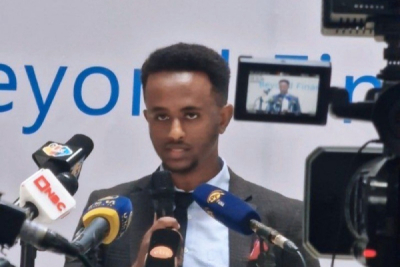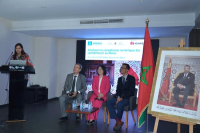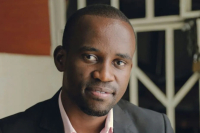A professional accountant, he decided to venture into e-commerce. With his SNAPnSAVE solution, he revolutionizes the way consumers perceive their purchases.
South African entrepreneur Mark Bradshaw (photo), founder and CEO of SNAPnSAVE, has developed a platform that offers consumers cash back on their purchases. SNAPnSAVE, launched in 2015, is a cashback app that rewards users with money back each time they shop. Bradshaw explained in 2017 that their receipt technology allows shoppers to earn cash back wherever they shop by simply taking a photo of their receipt. The technology is enabled without any point-of-sale integration, allowing the product to scale into markets without barriers.
In addition to his role at SNAPnSAVE, Bradshaw serves on the advisory board of Therefour SA & UK, a consultancy that provides small and medium-sized businesses with access to strategic and operational expertise in areas such as finance, marketing, and IT, tailored to each company’s specific needs.
Prior to founding SNAPnSAVE, Bradshaw co-founded Kaboose in 2012, a startup that provides a mobile shopping tool for consumer goods at supermarkets. The platform enables customers to save on in-store purchases through exclusive coupons, find products that best suit their needs, and locate the best prices in nearby stores.
Bradshaw is a graduate of Stellenbosch University, where he earned a bachelor’s degree in accounting and business management in 2000. He also holds a chartered accountant diploma, obtained in 2004 from the SA Institute of Chartered Accountants.
Bradshaw began his professional career in 2002 at the accounting firm BDO Spencer Steward, where he worked as an auditor. In 2005, he joined Rebserve Cleaning Services as the financial and operations director. He later served as the commercial director at skincare company Union Swiss from 2008 to 2011.
Melchior Koba
Chowdeck, a Nigerian startup operating in meal delivery, announced on Tuesday, April 30, the successful completion of a $2.5 million funding round. Speaking on the matter, Femi Aluko, co-founder of the startup, explained the funds will enable the startup to replicate its success in more parts of Nigeria and add value to customers, vendors and riders in “as many ways” as it can.
In an effort to contribute to the sustainable development of their country, three tech entrepreneurs have established a solution for financing collaborative projects through e-commerce.
DealKhir, a Moroccan startup, has introduced an innovative online commerce platform that allows users to purchase service products in support of sustainable association projects. The Casablanca-based startup, established in 2021 by Layla Medkouri, Hamza Bakkach, and Rim Machhour, is transforming the landscape of fundraising and patronage.
The platform operates by setting up a specific fund for each project. Users can directly access these projects on the website and make a purchase to support the ones they choose. The process is straightforward: select a project, purchase one or more products associated with it, and upon validation of the purchase, 70% of the amount is directly allocated to the project’s fund.
Layla Medkouri explains, “When you make a purchase of 100 dirhams (approximately $9.92), 70 dirhams are donated to the selected association projects. These projects are supported through these deals and indirectly by our partner companies who agree to lower their prices to increase attractiveness.” She further adds, “For instance, in the case of school transportation, each product purchased by a user contributes 70 dirhams to the dedicated fund. Once the target amount is achieved, all contributors, including consumers and partner companies, are notified.”
Initially, DealKhir concentrated on service products such as leisure, entertainment, travel, and fitness centers. However, it has evolved into a comprehensive online commerce platform where users can find a variety of items related to the projects being funded. Notably, it offers local cooperatives a free platform to market their products. Users can also contribute to a project without necessarily making a purchase.
Adoni Conrad Quenum
After earning a bachelor's degree in biology from the University of Korhogo in 2014 and a certificate in entrepreneurship from the Founder Institute in 2016, the Ivorian native embarked on a venture into the world of digital entrepreneurship. He chose to focus on educational technologies.
Etudesk LMS, an edtech platform developed by an Ivorian startup, offers users the ability to create online courses via its web interface. The startup, established in 2016 by Lamine Barro and headquartered in Abidjan, is carving out a niche for itself in the digital education sector.
The platform, which does not offer a mobile app, requires users to use a browser to create an account and access a page where courses are available. Users have the option of asynchronous training, which is individual instruction without participant interaction, or a cohort-based approach that allows group interaction. The training can be exclusively online or a blend of face-to-face and remote education, known as blended learning.
Once users have made these choices, they can upload documents and videos to the page and create various training modules. They can then share links to their courses through various channels, including social media.
Etudesk incorporates several features to streamline the management of online courses. The edtech platform enables the assessment of learners’ skills through practical activities and quizzes with an optional automatic grading feature, scheduling of videoconference sessions directly via the platform, and continuous interaction with the class through group discussion forums.
Etudesk offers a range of pricing plans, including a free plan. Other plans are priced at $69, $169, and $299 per month, respectively. Discounts are available to users who opt for annual plans. With the exception of the free plan, which remains unchanged, the edtech charges for 10 months out of the year for users who choose the annual plan.
Adoni Conrad Quenum
Robust ID systems can curb cybercrime and boost Africa's economic development by enhancing security and trust in digital transactions. Accurate identification enables targeted resource allocation, fostering financial inclusion and driving economic growth.
The Central Bank of Uganda, BoU, recently mandated a government-issued ID presentation for digital transactions exceeding one million Ugandan shillings ($260). The move, announced on April 19, aims to combat digital payment fraud in line with regulatory requirements.
The institution revealed in a tweet that it has “observed a rise in the usage of mobile money platforms for online fraud and scams. Mobile money systems have occasionally been the target of cybercrime carried out by agents working with criminals.”
Valid national IDs or passports are now necessary for transactions surpassing one million Ugandan shillings.
KPMG, in its Africa Cyber Security Outlook 2022 Survey, reveals that East Africa has the highest proportion of cyber-attacks in Africa, with 31% reported incidents. Also, despite 39 out of 54 African countries having cyber security legislation, Africa's adoption of such policies stands at 72%, the lowest globally.
Strengthening cybersecurity measures is crucial to enhance digital resilience and protect financial systems and individuals from future threats.
Hikmatu Bilali
Trained as an architect and passionate about technology, he has amassed solid expertise in the digital field. He now leads three technology companies, including Room.et, which focuses on real estate management.
Natnael Mekonnen Tsehay is an Ethiopian tech entrepreneur and the founder and CEO of Room.et, an online room-booking service for hotels, apartments, and guest houses. His aim is to change the way people book stays in Africa.
Founded in 2021, Room.et is an online hotel aggregator offering a virtual marketplace for available hotel rooms. With a dedicated website and mobile app, the platform allows users to discover and book hotel rooms based on criteria such as price, room type, and desired amenities, while offering various payment solutions.
A serial entrepreneur, Natnael Mekonnen Tsehay also founded WAKANDA Technologies in 2018, a company specializing in IT consulting, outsourcing services, and information technologies, helping businesses achieve their goals with modern digital solutions.
In 2019, he launched Ethiopian Business Daily, where he serves as the General Manager. The media outlet provides daily business news in Ethiopia, covering startups, business activities, trade regulations, and technology.
Natnael Mekonnen Tsehay holds a Bachelor's degree in Architecture obtained in 2019 from the Ethiopian Institute of Architecture, Building Construction and City Development (EIABC). He also holds a certificate in Real Estate Management from Addis Ababa University.
Melchior Koba
Food delivery platform Glovo will cease operations in Ghana on May 10, 2024, despite a previous €3.5 million ($3.7 million) investment for expansion, citing profitability issues.
Following this, Glovo will focus on other African markets, including Morocco, Uganda, Kenya, Côte d'Ivoire, and Nigeria.
Despite Co-founder Sacha Michaud's positive outlook on Ghana's market in 2021, challenges such as high taxes and inflation have led to this decision. Yet, the online food delivery market in Ghana is projected to generate US$224.60 million in revenue in 2024.
Morocco becomes the fourth African country to join UNESCO Digital Skills Initiative, Following Côte d'Ivoire, Egypt, and Nigeria
On Tuesday, April 23, Moroccan authorities, in collaboration with the United Nations Educational, Scientific and Cultural Organization (UNESCO) and Chinese tech giant Huawei, initiated a program aimed at enhancing the digital skills of educators, particularly those teaching literacy. The objective is to boost the digital competencies of 10,000 literacy educators by 2025. The launch was announced last week through press releases from both UNESCO and Huawei.
“Literacy is the foundation of lifelong learning and a driver for sustainable and participatory development. In light of the digital transformation, it is essential that literacy instruction leverages the full potential of technology. We are proud to support the Kingdom of Morocco as a member of the UNESCO Global Alliance for Literacy in improving the digital skills of 10,000 literacy teachers by 2025,” stated Isabell Kempf, Director of the UNESCO Institute for Lifelong Learning (UIL).
This program is a component of the national strategy for the digitization of education, which is part of the Morocco Digital 2030 strategy. The strategy aims to position the kingdom as a regional leader in digital education. In November 2023, the Moroccan government collaborated with American company Oracle to foster digital skills in higher education, thereby providing professors and students with access to training, learning resources, and specialized software.
In essence, the implementation of this initiative will enhance the quality of education in Morocco, better equip students for the digital era, and bridge the digital divide in the kingdom.
Adoni Conrad Quenum
In order to provide employees with easy access to financial services, two tech entrepreneurs launched a custom fintech solution. They named it after salad, a dish known for its various health-benefiting ingredients.
Salad Africa, a fintech solution developed by a Nigerian startup, is designed to ease employees’ access to financial services through partnerships with employers. The startup, established in Lagos in 2022 by Chikodi Ukaiwe and Seunfunmi Omotunde, works directly with employers for prequalification and access to unique employee data. “By working with us, employers maintain their cash flow from no longer having to fund salary advances, boost their employees’ productivity and attract the best talent,” Ukaiwe said.
The fintech’s goal is to create a system that enables employees to access their wages on demand, avail of savings products and wealth-building, pay for airtime and internet data, or subscribe to online services. To achieve this, it has developed a mobile application, available on iOS and Android (downloaded over 500 times, according to Play Store statistics).
To use the service, users must create an account by providing information such as their company’s name and address, registration number, tax identification number, total number of employees, and volume of monthly payments. After this step, Salad Africa sends an email, and it takes 24 hours to finalize account creation following routine verifications. Once the account is created, users can access the services offered by Salad Africa.
“Our services are live and available to employers and employees across all states in Nigeria, with plans to expand into Ghana and two new markets in East Africa over the coming months,” Ukaiwe told Disrupt Africa in May 2023.
Salad Africa charges transaction fees for all operations on its platform, including interest on loans, commissions from third-party financial service providers, and net interest income from customer deposits.
Adoni Conrad Quenum
As a tech entrepreneur, he develops innovative solutions to improve access to healthcare. His commitment to public health in Africa has been widely praised.
Brian Turyabagye (photo) is a Ugandan tech entrepreneur who graduated from Makerere University in 2023 with a Master's in Telecommunications Engineering. He also holds a Master's in Business Administration from the Valar Institute, obtained in the same year. He is a co-founder and the CEO of MamaOpe Medicals, a healthtech company.
Founded in 2017, MamaOpe Medicals aims to improve access to quality healthcare, especially in resource-poor regions. It focuses on detecting and managing respiratory infections using innovative digital tools.
The medical device developed by this startup enables the early detection of vital signs of respiratory diseases, such as respiratory rate, lung anomalies, and heart rate, by analyzing different lung positions. Featuring a cloud platform, this tool provides healthcare professionals with a simple and fast way to make accurate diagnoses, thereby improving the chances of effective patient treatment.
Brian Turyabagye's professional career began in 2013 at the Uganda Communications Commission, where he was an intern. The following year, he also interned at iLabs@MAK, a research project at the College of Engineering, Design, Art, and Technology.
After his internship, iLabs@MAK hired him as an assistant team leader. In 2015, he was appointed as a software development consultant. Concurrently, he joined the NCBA Group, a banking group based in Kenya, as a systems manager. He worked there until 2018 before dedicating himself full-time to MamaOpe Medicals.
Recognized for his contributions to the medical sector, Turyabagye has received several awards, including the African Innovation Prize in Engineering from the Royal Academy of Engineering in 2016 and a mention among Africa’s brightest innovators at the Next Einstein Forum in 2018.
In 2022, MamaOpe was honored at the ASME's ISHOW Kenya competition, further confirming the significant impact of this enterprise in the healthcare sector.
Melchior Koba
More...
Faced with the growing enthusiasm for social media, an increasing number of advertisers are turning to these platforms to promote their products. However, many platforms sometimes do not comply with the regulations imposed by the government.
On Thursday, April 24, the Mauritanian Advertising Regulatory Authority (ARP) granted the first 12 permits for ordinary individuals to advertise on social media. This move is part of an initiative to foster a legal, healthy, and organized advertising practice on social media platforms.
At an official ceremony in Nouakchott, Doro Sow, the ARP Administrative and Financial Director, underscored that these new permits do not limit advertising freedom. Instead, they are necessary for ensuring compliance with Mauritania’s advertising laws.
The issuance of these permits is a component of the ARP’s new approach to regulating advertising on social media platforms. This strategy follows the ARP Council’s publication of deliberation No. 01/2024 on March 12, 2024. The deliberation outlines the conditions for authorizing advertising on digital platforms and personal social media accounts, as well as the procedures for revoking these authorizations.
The decision required individuals advertising on social media to comply with the law within a one-month period starting March 13, 2024. The first licenses were consequently issued to individuals who adhered to this procedure.
The ARP’s objective is to regulate digital platforms and ensure adherence to advertising laws across the Islamic Republic of Mauritania. The country’s Law No. 2018-017 on advertising stipulates two regimes for conducting advertising activities and related services: the authorization regime and the declaration regime, each depending on the specifics of the activity.
Samira Njoya
Enhancing digital infrastructure and facilitating cross-border telecommunications can greatly benefit Africa's economic development by improving connectivity and enabling online commerce, fostering innovation and growth across the region.
The Ministry of Communication and Digital Economy of The Gambia has unveiled the US$50 million Western Africa Regional Digital Integration Programme (DTfA/WARDIP) SOP-1. Funded by the International Development Association (IDA) and supported by organizations like the African Union, Smart Africa, and ECOWAS, the initiative, launched on April 24, aims to transform the digital landscape across The Gambia, Guinea Conakry, Guinea-Bissau, and Mauritania.
Ousman A. Bah, Minister of Communication and Digital Economy of The Gambia highlighted the program's objectives, emphasizing its role in addressing critical digital challenges and unlocking opportunities. The initiative comprises three components: connectivity market development, data market development, and online market development, aimed at fostering cross-border telecommunications, facilitating data-driven services, and enhancing the digital ecosystem for cross-border commerce.
For Lacina Kone, CEO of Smart Africa, the initiative is a milestone in regional digital innovation and integration, emphasizing the importance of collaboration for economic transformation.
Access to the internet and connectivity are crucial for economic development in developing nations. The World Bank's Policy Research Working Paper 9853 highlights that expanding 3G and 4G connections by 10 percentage points can boost the economy by 0.41 percentage points, with 3G contributing 0.02 percentage points and 4G contributing 0.05 percentage points. Overall, increasing internet penetration enhances annual growth per worker by 0.6 percentage points. Yet, despite global mobile broadband coverage, approximately 16% of the population in central and western Africa lacks access, as reported by the ITU Mobile Network Coverage Facts and Figures 2023.
According to World Bank data, The Gambia's internet usage rate was 33% in 2021. However, access to fixed broadband remains significantly below the global average of 13.6, standing at 0.19 per 100 inhabitants. Mobile subscriptions are higher, with 101 subscriptions per 100 inhabitants, but 4G uptake remains low, accounting for just 4.5% of all data subscribers.
Hikmatu Bilali
Passionate about digital transformation, Mouhamadou Taha Thioye is dedicated to developing solutions that make life easier for all Senegalese people. His latest solution is a payment aggregator.
Senegalese tech entrepreneur Mouhamadou Taha Thioye (photo) is the founder and CEO of Keyzen, a company that simplifies the management of payment operations for Africans.
Established in 2023, Keyzen is a fintech firm that consolidates services for Visa prepaid cards, mobile money, and all other financial transactions into a single mobile application. This solution streamlines the process of purchasing and reloading Visa cards, while also facilitating the management of various payment channels.
Keyzen also allows Senegalese individuals to order their Visa cards and enjoy the convenience of one-day delivery. The company has already achieved a transaction volume exceeding 250 million CFA francs, equivalent to more than 400,000 US dollars.
Thioye earned a National Diploma in Telecommunications Engineering in 2004 from the National Institute of Posts and Telecommunications (INPT) in Senegal. He began his professional journey in 2004 at M2T (Morocco Transaction Processing), where he served as a development engineer.
In 2008, he joined ATPS SA, a technology company specializing in financial services, as a director in Senegal. By 2018, he had risen to the position of CEO of the holding company and its subsidiaries. He has played a significant role in establishing and developing the company’s subsidiaries in the WAEMU zone.
Melchior Koba
Data centers are becoming the backbone of cloud services adoption. They provide users with everything they need to get started – online storage, computing power, software, servers, and applications – all accessible over the internet.
From 2012 to 2022, the number of data centers in West and East Africa saw a significant increase, jumping from 9 to 134. This information was highlighted in the "Digital Progress and Trends Report 2023" published by the World Bank in March 2024.
The report explains: “Development funding for data centers is increasing to fill the financing gaps. In Africa, where an estimated annual investment of between US$4 billion and US$7 billion is needed to bridge the region’s data center gap, the US International Development Finance Corporation is providing funding of US$300 million to Africa Data Centers to support the expansion and development of seven existing and greenfield data centers in five African countries.”
The ongoing technological revolution in Africa, accelerated by the digital transformation spurred by the COVID-19 pandemic, has made digital infrastructures, especially data centers, essential. An increasing number of globally recognized providers have established a presence on the continent, leading to a rise in the number of these infrastructures in Africa.
Several American companies, including Raxio Data Centres, Digital Realty, and Oracle, along with France's Orange and China's Huawei, have set up operations in various African countries. Local entities like Africa Data Centres, Paix Data Centres, Onix Data Centres, and MainOne continue to expand across the continent. In addition to private sector involvement, African governments are also investing in these infrastructures in their pursuit of digital sovereignty.
The "Cloud Computing Market" report published in December 2023 by U.S.-based market research firm MarketsandMarkets projected that the global cloud market would grow from $626.4 billion in 2023 to $1,266.4 billion by 2028, with a compounded annual growth rate of 15.1%. While this growth is promising, Africa and the Middle East hold marginal shares compared to North America, the undisputed leader in the sector, according to the same source.
Adoni Conrad Quenum















